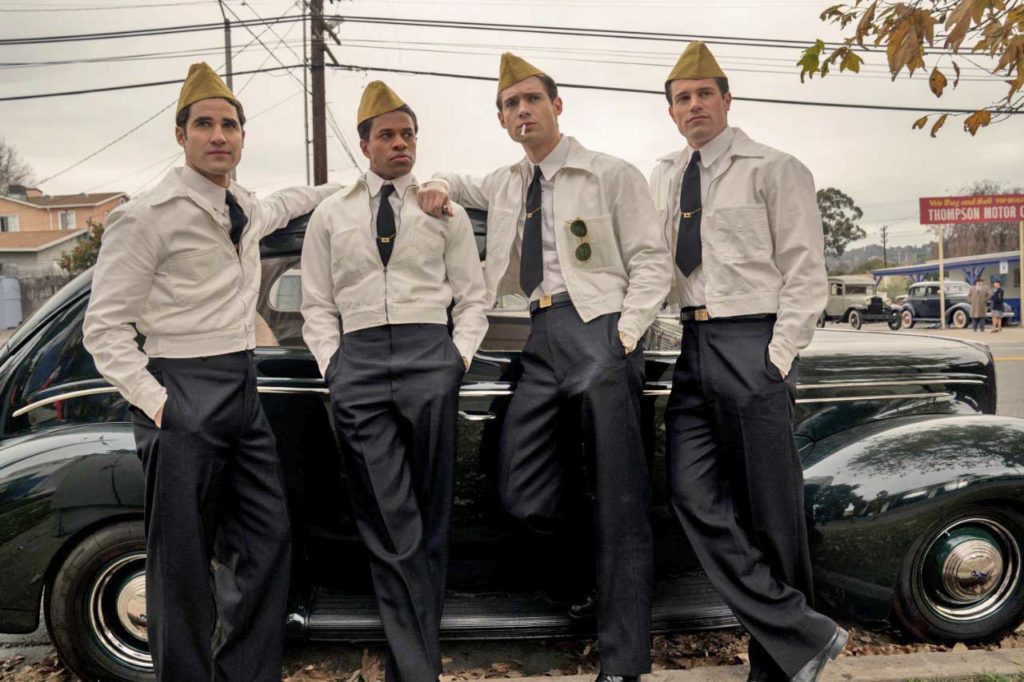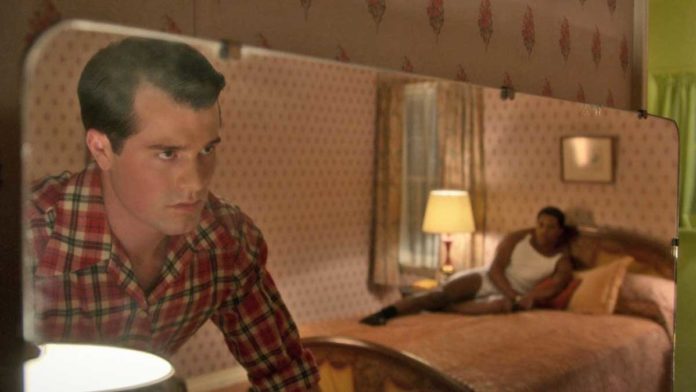The new mini-series “Hollywood,” out May 1 on Netflix, puts a revisionary — and queer — spin on the 1940s film industry. Co-created by out, gay executive producer Ryan Murphy, the story concerns Jack (David Corenswet), an aspiring actor who takes a job as a sex worker for Ernie (Dylan McDermott), a Scotty Bowers-like pimp.
When Jack meets the Black, gay writer Archie Coleman (Jeremy Pope), he encourages Archie to work for Ernie. Archie does, and soon beds — and falls in love with — Roy (Jake Picking). Roy is also an aspiring actor, and under the tutelage of the gay Henry Wilson (out actor Jim Parsons), he is renamed Rock Hudson. And before long, Jack and Rock are vying for the starring role in a film being made from Archie’s script.
There is more (much more) to “Hollywood,” from George Cukor’s wild gay parties to scenes of closeted executives coming to terms with their sexuality, to women taking studio power and even gay actors coming out. The series may be a “what if” story about Hollywood dreams, but it’s an entertaining wish-fulfillment fantasy.
For actor Jake Picking, who plays Rock Hudson, making “Hollywood” was a heady experience. In a recent phone interview, the actor demurred when asked about the lure of being a celebrity, “I just want to work with great people and tell inspiring stories. When I was growing up and going to the movies, I liked to laugh and cry in the same film. It’s a triumph to be part of a hopeful and empowering show like ‘Hollywood.’”

Picking plays Hudson well, even if it is not quite the Rock Hudson fans might expect. In “Hollywood,” Hudson embraces his sexuality and lives openly with Archie. However, this relationship causes Henry Wilson grief; he needs to keep Rock out of the scandal magazines to protect his client’s career.
About tackling this progressive Rock Hudson, Picking said, “I can only hope that Rock is rooting for that notion of what the show represents and that sentiment. I really just want to capture the essence of who Rock was. Paying homage to him as best we could. When he came to prominence, it was idolatry before it became admiration. I felt pressure to be truthful to Rock. It’s hard not to feel that, as he is such an icon. That’s what I was apprehensive about — pointing to his truth. But there was a tragedy with him having to keep secrets. We should strive for not caring about other people’s opinions. To judge someone is to be closeminded and toxic. Rock was a hero at the end of the day.”
To prepare for the role, Picking read about Hudson’s relationships with his father, his stepfather and mother, and the personal anguish he had. In addition, he listened to interviews with the actor and watched Hudson’s films, such as “All that Heaven Allows,” without sound, to study and learn the actor’s body language.
One of the more amusing scenes in “Hollywood” features Rock at an audition. He requires numerous takes to get a single line reading right. (This is based on fact). Picking acknowledged that Rock “struggled at first in his career but was resilient.”
When asked about having to “act badly” on purpose he confessed, “Those were hard scenes to do because you have to memorize it in a way that’s incorrect. But it was also a lot of fun — after you go through that humiliation.”
But the vulnerability that makes Hudson guarded also makes him sympathetic. “Hollywood” shows what the future celebrity may have encountered early on in his career. As Henry grooms Hudson for stardom, he is merciless. One of the kindest things Henry says to Hudson is, “You smell like milk,” indicating the wholesome quality that will make him a star. Generally, Henry is abusive, asking Rock to strip and even to perform sex acts. One strange late-night encounter has Henry performing an Isadora Duncan dance performance for a befuddled Hudson. Picking recalls that scene with a laugh, “We shot that sequence at the end of a long day and late at night. We were incredibly loopy.”
Henry’s behavior is abusive, but that is one of the key points of “Hollywood”— how aspiring actors and writers are mistreated. The series also asks viewers to rethink how social acceptance may have occurred sooner if there was greater visibility for minorities in movies.
Picking observed, “I think, unfortunately, abuse of power is something that’s always happening [in Hollywood]. There is a battle for equal representation and opportunity for women, people of color, and members of the LGBT community. It’s ironic [in “Hollywood”], but that’s what we were trying to go deeper into — the truth of what was happening to bring those things to attention.”

